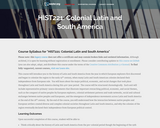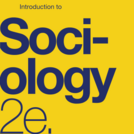
This course will introduce the student to the history of Latin and South America from the year in which European explorers first discovered and began to colonize the region to the early 19th century, when many Latin and South American colonies declared their independence from European rule. The student will learn about the major political, economic, and social changes that took place throughout Latin and South America during this 400-year period. By the end of the course, the student will understand how the interaction between native peoples and European settlers created diverse and complex colonial societies throughout Latin and South America, and why the colonies of the region eventually declared their independence from European political control. Upon successful completion of this course, student will be able to: Think critically about the history of Latin and South America from the pre-colonial period though the beginning of the 19th century; Compare and contrast the political, economic, and social practices of the peoples of Iberia, Africa, and the Americas in the pre-colonial period; Analyze the political, social, and military interactions between Iberian explorers and conquerors and the indigenous peoples of the Americas in the 15th and 16th centuries; Identify how Spanish colonists settled Latin and South America in the 16th century and analyze the role played by imperial and religious institutions in colonization efforts; Assess the role of European Mercantile policies in the formation of colonial economies and trade networks; Analyze the structure of Spanish and Portuguese colonial societies and assess the role of women, indigenous peoples, and Afro-Latinos in these societies; Students will be able to assess the status of Latin and South American colonies in the Spanish and Portuguese Empires of the 17th and 18th centuries and identity how European conflicts affected political and economic life in the colonies; Identify how the Napoleonic Wars of the early 19th century led to the rise of independence movements in the colonies of Latin and South America; Assess how political revolutions and wars for independence throughout Latin and South America ended European colonial control of the region, and compare and contrast the consequences of these revolutions for ethnic European and indigenous populations; Analyze and interpret primary source documents from the pre-colonial period though the beginning of the 19th century using historical research methods. (History 221)
- Subject:
- History
- World History
- Material Type:
- Full Course
- Provider:
- The Saylor Foundation
- Date Added:
- 02/20/2019


